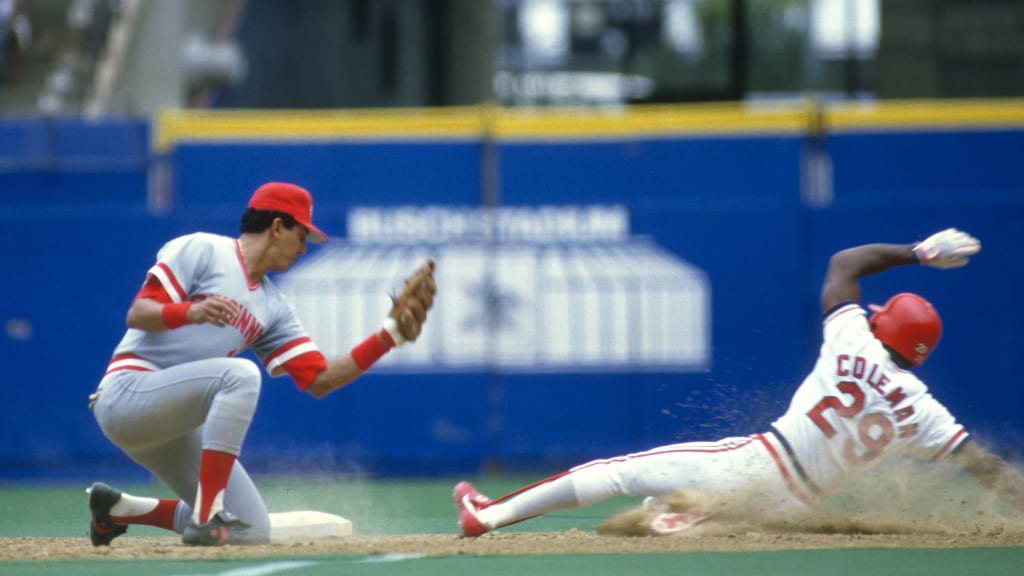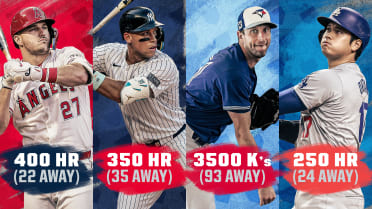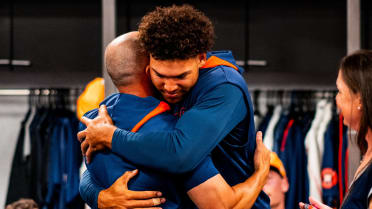A version of this story originally ran in January 2021.
It was June 1, 1986, and it was a big day for Reds starter Chris Welsh.
The 31-year-old was making his debut for Cincinnati -- the hometown team he grew up cheering for -- and he was excited.
"Yeah, I had my family and my friends there," Welsh, now a Reds broadcaster and author, tells MLB.com. "I remember it as clear as you can look back from now to 1986."
But right away, the lefty got himself into trouble: He walked Vince Coleman.
The reigning NL Rookie of the Year was the fastest man on the planet and 1985's stolen base king. He'd once been clocked at a blistering 31.6 feet/second. He'd swipe close to 550 bags in his first six big league seasons. He was not a guy you wanted anywhere near the basepaths.
"You knew when he was on base, his number one goal was to steal. Period," Welsh says.
Welsh was already nervous pitching in his first Reds game in front of his family and friends, and having someone as fast as Coleman jumping on and off first didn't help.
And Coleman did steal. He stole second and then he stole third. He was thrown out at home trying to score on sacrifice fly, but the Cardinals did get a run, taking an early 1-0 lead.

Welsh got Coleman out on a double play in the second inning, but then, in the top of the fifth, the man known as "Vincent Van Go" was back on first base.
Welsh had given up a single to St. Louis' leadoff batter. But this time, with his team trailing the Cards, 2-1, Welsh was going to do everything in his power to keep Coleman at first.
"I once heard from someone in the Minor Leagues, I can't remember who, but he said: 'You know my theory on picking runners off? Throw over one more time than you think is necessary,'" Welsh tells me. "I guess I took that to the extreme."
Amidst boos from his own Riverfront Stadium crowd, bewildered looks from hitter Willie McGee and with Jack Buck growing more and more agitated in the broadcast booth, Welsh attempted a mind-boggling 17 pickoffs to first base.
It took seven minutes and 21 seconds, although Buck can be heard in the clip saying "15 minutes" or, multiple times, "forever." Welsh had never issued that many throw-overs in his professional career and, if you look back on recorded baseball history, you'll be hard-pressed to find any that equal it. With less focus on stealing in the modern game, you'll also likely never see it again.
"I just knew he was going," Welsh says. "I knew he was gonna steal."
Welsh had played against Coleman in the Minors -- you know, the Coleman who stole a then-MiLB record 145 bases for the Class A Macon Redbirds -- so he had been involved in these situations with the speedster before.
"He did the same thing back then," Welsh recalls. "We tried to pick him off first, he'd steal second. We'd try to pick him off second and he'd steal third. It was just a cat-and-mouse thing with Coleman."
Coleman doesn't remember the encounter as well as Welsh (he does remember being in awe whenever he shared first base with Pete Rose, one of his idols), but he gave a good description of what he was probably thinking.
"I had knowledge against every pitcher I faced," Coleman says. "Every pitcher had a flaw, tips or tendencies. When he came set -- and I mean Welsh, but not only Welsh -- I'm talking about all left-handers. If you look at Jim Deshaies, Bruce Hurst, Zane Smith, Frank Viola, [Rick] Honeycutt ... [Coleman went on to name almost every left-hander he ever faced in baseball] ... when they came set, I knew when they were going home or going to first. Now, that may seem kinda cocky, but I had that knowledge."
It's hard to argue with a guy who had 752 career steals and an 80 percent success rate during his MLB run.
Welsh, though, thought he had a pretty good move. And he did nearly catch Coleman a few times back at the bag.
"I would have a lot of my weight on my right foot. And then, when I lifted my weight up with my right foot, I would kinda rock back," Welsh says. "My theory was that would kinda make the runner hesitate because at that point he wouldn't be sure which way I was coming. ... I always thought left-handers had a better chance because you could look right into the runner's eyes."
But none of that was working against Coleman this time around. Even after five, 10 or 15 times. He was a base-stealing guru, a tenured professor at the School of Steals.
"I call it Dissecting Left-Handers," Coleman says. "You start at the head, you look at the hands, you look at the knees and you look at the feet. All lefties are not gonna be the same, but out of those four categories, there's certain parts that give them away. You have to study that and be a student of it by looking at film."
Even quick snap-throws weren't fooling Coleman.
And what about McGee?
Poor Willie McGee, who, like Coleman, doesn't totally recall the moment, had to stand in the batter's box for much of the never-ending back-and-forth.
"Yes, it tests your concentration a bit, but hitters, like golfers and other athletes, have a routine," McGee tells MLB.com. "I would always give Vince a strike or two to go anyway. But yeah, I've never seen anything like it."
Welsh had played with McGee back in the Yankees' Minor League system, so there was already a connection when he came up to the plate.
"First of all, he smiled when he came to the plate," Welsh says with a laugh. "Like a nod of acknowledgement. ... But I could tell he was kinda smiling every time I threw over."
The reigning NL MVP saw FOUR total pitches in a little over FOUR minutes. He did take the first strike, took a pitchout, fouled off a strike and then struck out swinging. In between, Welsh threw to first 13 times and faked throws twice.
As Buck says in the clip, "Tough for the hitter to concentrate with all that going on."
Welsh remembers Coleman chuckling at first and first baseman Rose urging his pitcher to get on with the game. But what he recalls most is the home crowd turning on him.
"Yeah I remember almost being booed out of the stadium," he says. "They wanted to get the game going. The only people who weren't booing were the concessionaires. They loved it."
Finally, though, after the next batter Andy Van Slyke saw just three pitches in about three minutes, including a pitchout (these were sandwiched around four more pickoff attempts and two step-offs), Coleman took off for second. Catcher Bo Diaz dropped the ball and an exasperated Coleman arrived safely.
Van Slyke popped up to shortstop and the inning ended with Coleman stranded at second. Funny enough, Welsh did pick off Coleman later in the game -- it was the last out of the seventh inning. It also ended up being Welsh's last out of his start. The Reds lost the game, 2-1, but Welsh had finally gotten his man. This time, it only took six throw-overs.
Still, he can't believe that at some point during his 17-throw showdown, he couldn't trick one of baseball's all-time stolen base greats.
"What Coleman used to do and Tommy Herr and Tony Gwynn and other speedsters along those lines, when they got picked off, they'd just keep running," Welsh says. "They hoped that they could beat the throw [to second]. Pete Rose was playing first and he had a pretty decent arm and I thought I had a pretty good chance but, well, you know."
Coleman talked to McGee separately about the clip, and the two couldn't stop laughing. McGee told him, "Vince, you know, man, you changed the whole game with you being on base. It became a whole different mentality."
"There's only a few guys that have ever stole 100 bases [in a season]," Coleman says. "And I was one of the lucky ones. But I refuse to let anybody say I stole bases because I was fast. That's not true. I was focused, I was alert, I was savvy, I was bright, you know, I was smart. I knew what the hell I was doing and what I was looking for. And if I had a clue on your limitations, I'm gonna bury you. And that's the way I made a living."
Matt Monagan is a writer for MLB.com.




